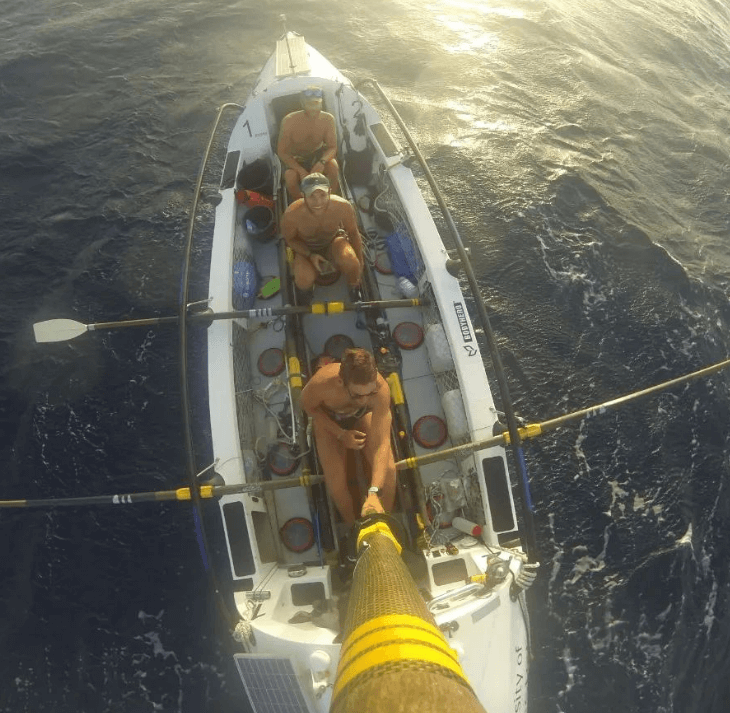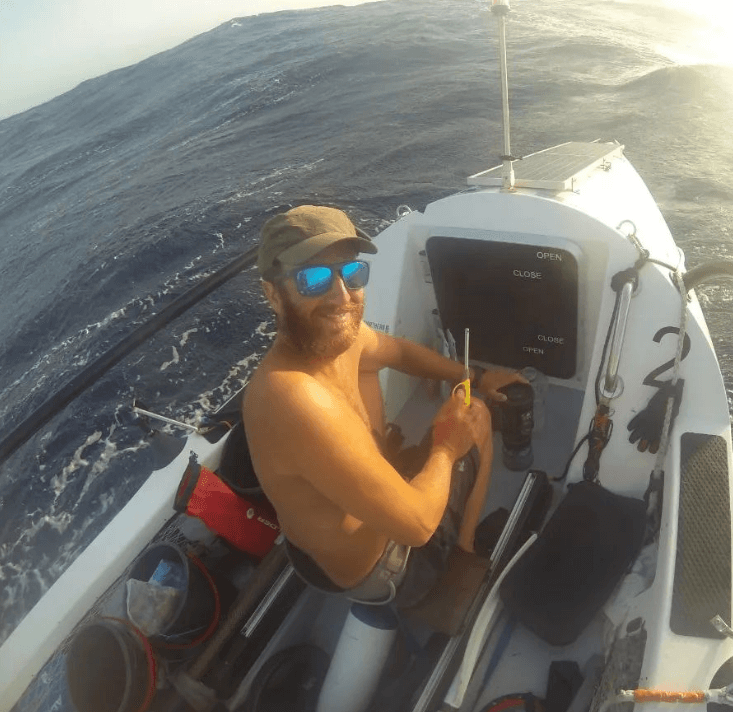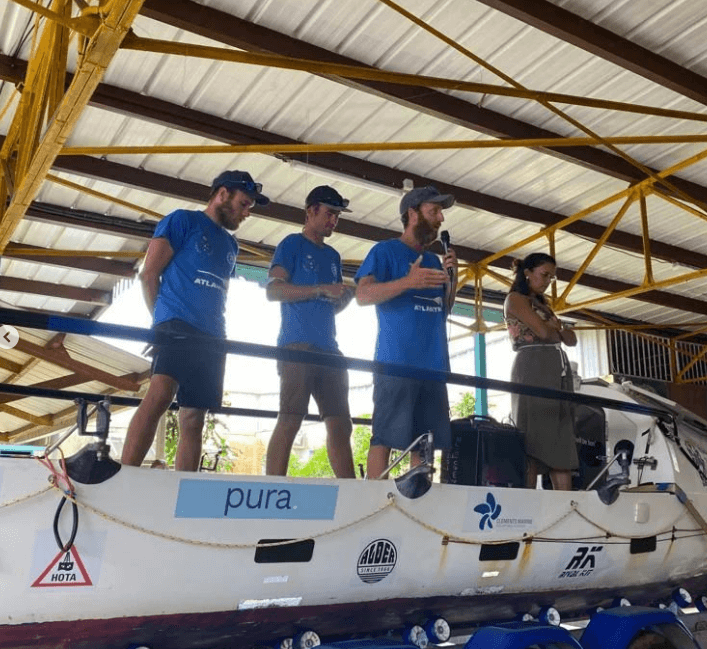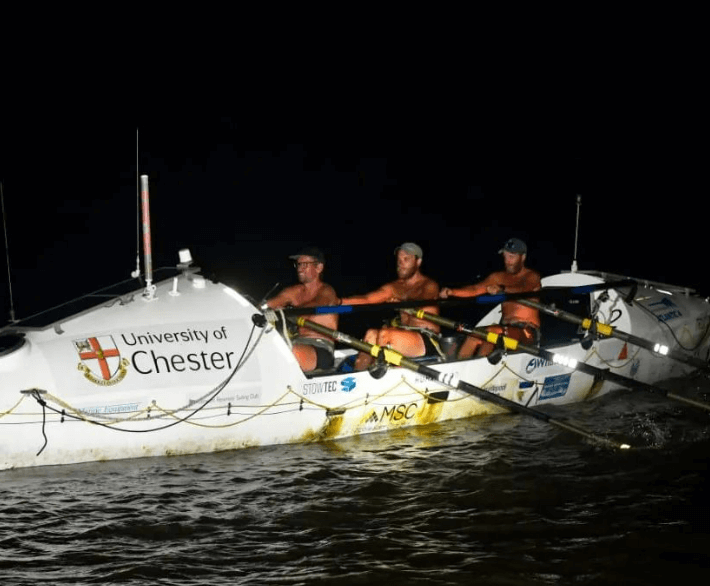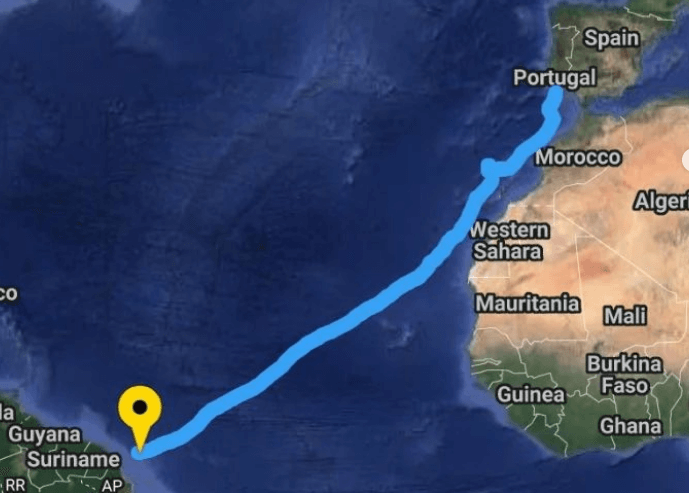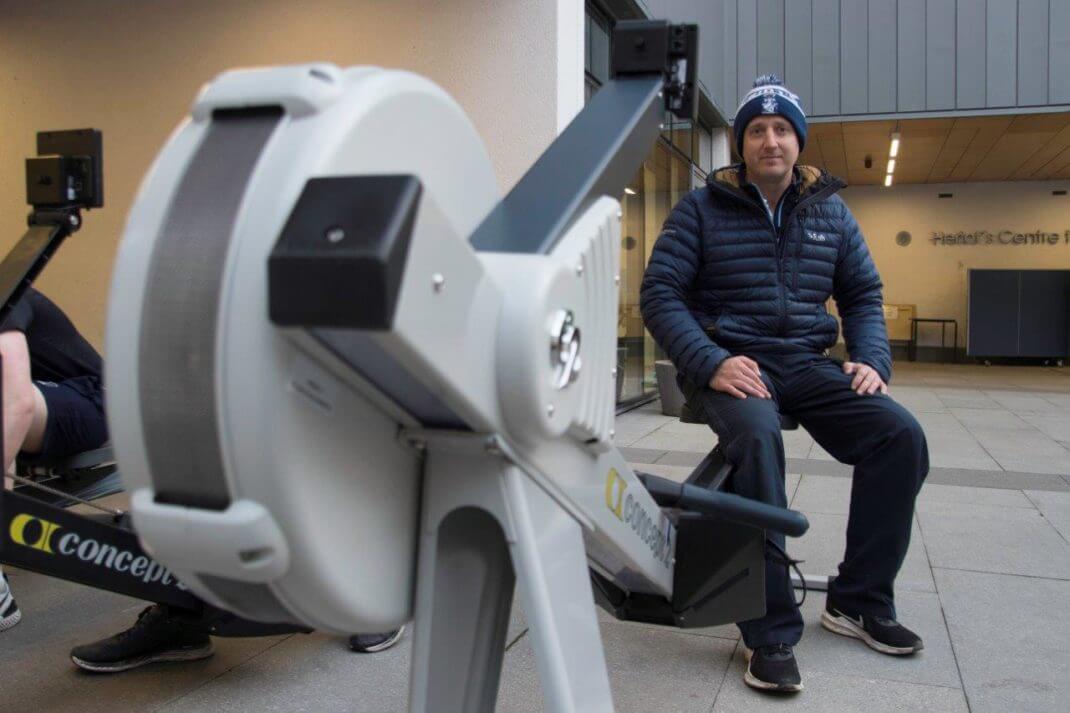



A raw, emotional interview with Heriot’s Head Rowing Coach, James Davidson as he tells us all about his mammoth, mainland to mainland Atlantic Rowing Challenge.
Until this year, there had never been a team of 3 that had attempted to cross The Atlantic from mainland Europe to mainland South America. James, Tom and Rob became the first trio to row this route and they raised money for two worthy Charities; Surfers Against Sewage and Our Blue Light.
Why did you decide to take part in the challenge?
Tom (one of the team members) and I rowed at University, because rowing is such a tough sport and you get so fit and strong, you realise exactly what you are able to achieve and so the seed was planted many years go. With that, we came up with new ideas and the ultimate challenge would be rowing the Atlantic. Tom came back to me a few years ago and asked if we should do it, and the decision was made!
That’s one thing that I like to do, come up with an idea and see it through.
How many years in the planning?
From making the decision, it was probably around three years in the planning. A year of researching and fact finding, then two years of actually having to do and plan everything. This included all of the training courses, finding a boat, practising in the boat etc.
We would do 2 hour ergos and a 3 hour ergo on the rowing machine but a lot of what we did was getting physically fit on the row itself. After a few weeks of rowing 24 hours a day we got pretty fit!
The main thing that we needed to do was get the technical parts sorted, like the safety aspects surrounding the row. We would practise long 24-hour rows out in Hartlepool which was pretty difficult when you are feeling seasick.
How quickly did you get over the sea sickness?
The worst of it was the first 5 days, where you would be feeling really really sick and physically drained as well.
Another bad period was when we went into the para-anchor situation for 9 days due to bad weather conditions. This involved 2 of us laying in a tiny cabin, on our backs for 9 days straight in what best could be described as being inside a washing machine. Tom and I shared two meals between us over the course of those 9 days as we just felt so sick we couldn’t eat and didn’t feel like eating anything. I basically laid on my back, or on either side and changed position every half hour for 9 days.
We had communication with a weather router that we spoke to, and he saw the storm coming and gave us warning that we were going to be on para-anchor for 3-4 days and we thought oh ok let’s just hold it out. We got into it, few days into it and he tells us that it’s going to be another week of bad weather. That was it really. Once we knew it was going to be another week, we knew we just had to wait it out, there was no way we could row against it.
One of the 9 days we managed to stand up and come out on deck as the conditions calmed down a bit. We slept as much as possible, watched a few movies on our mobile phone screens and that was it. Because we felt so ill and seasick, there would be days that Tom and I wouldn’t talk to each other, we just focused on sleeping and resting. It’s not something that I would like to do again.
What was the most mentally challenge aspect?
Initially, adapting to the environment over the first week or so was incredibly difficult. We are so used to moving freely around the place, when you are in the boat you are stuck in one position, you aren’t walking – you are either laying down or sitting in one position.
With seasickness, rowing through the dark nights, rowing for 12 hours a day and resting for 12 hours a day was the routine.
The para-anchor situation mentioned previously was mentally challenging.
After that, the relentlessness. When we reached 40 days in, as we approached roughly the half-way point, we thought this should be a celebration until we recognised how difficult it had been thus far and we then wondered how we would do the first 40 days all over again. It just seemed unfathomable we would ever get to the other side. When we had only around 5 days to go, it started getting a little bit easier as we were counting down.
Every mile we did we thought, oh this is awesome, we have clocked another mile! One of the big targets was getting to only 99 miles to go.
Did you manage to keep track of days of the week?
No, not really. We would try and keep track and kept a tally on the wall of how many days we had done.
How many hours of rowing were you doing each day?
2 hours on 2 hours off during the day and then 3 hours on 3 hours off during the night.
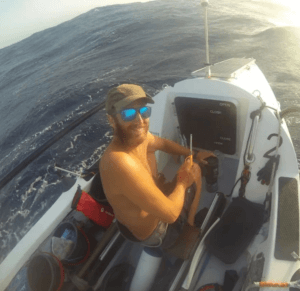
How did you cope with the unpredictable weather at sea?
Huge waves! When we were going across the waves, they were really scary. If you stay perpendicular to the waves, you tend to just bob over the top of them, however if you had to change your angle and row from the side the waves crash over the boat and that was the worst part. Rowing at night as well, when you can’t see the huge waves coming – with our lights all we could see was on the boat and not the waves crashing around.
Sometimes we were swept off our seats – thankfully no one got swept overboard. That would have been a pretty bad situation.
It was quite a big task when we had to clean the bottom of the boat. It turned in to quite a big operation to do this, the waves were massive, and we were having to keep the boat as straight as possible, look out for jellyfish and sharks, and make sure the tether didn’t get tangled. One of us would be with the tether making sure it didn’t get tangled, one of us would be steering the boat and looking out for the wildlife and Tom was under the boat scraping the barnacles off the bottom and trying not to bang his head! It was pretty dangerous. When you are rowing, you had to be on full concentration mode.
The mental challenge is the biggest thing. Physically we got stronger, but mentally the challenge would slowly break us down. Coupled with fatigue, exhaustion from rowing, the constant sun on us.
We were a real good team of 3 – we all had similar mind sets and we all looked out for each other and we didn’t want to let each other down. There was no way that one of us would say ‘I can’t row today’ as someone else would have to row for you.
How were the feelings in the last 5 days?
We were on high alert as we approached the last week as we were worried that something was going to go wrong, we didn’t want to become too complacent.
We were dreaming of what the first meal would be, what it would be like when we finish, what it would be like to see our families and how the legs would feel hitting dry land. We lost a fair bit of muscle on our legs and glutes as we weren’t walking or standing.
How was the final stretch?
We landed in French Guiana and the currents around there were immensely strong so our speed was great – we were flying along. I think we covered over 100 nautical miles one day which is by far the biggest day we had.
We knew we were within striking distance and we agreed that once we got close we would do everything we could to get there. Normally we would have two rowing or one rowing while the other person was resting. In the last 24 hours we decided to just go for it, we did 12 hours straight on the oars, only stopping to have a quick drink or a cereal bar and just kept rowing.
We got to the finish and were just exhausted. We were so motivated it felt easy at the time, but when we finished we were just broken. It was such a brilliant feeling.
We were in contact with a guy in French Guiana called Patrice and he banged up a storm for our arrival. There was a crowd of people who we didn’t know waiting at the finish line, all of our families, girlfriends and wives were there.
To see that boat coming to greet us as we approached French Guiana was such a good feeling – we knew we had made it that point. This was also the first glimpse of human contact we had the entire trip – minus spotting a few cargo ships in the distance in the middle of the ocean.
How were the celebrations when you finished?
A street party had been organised for us on the main strip in their town. Patrice had us going up and down all of the restaurants and they put on a lot of food and drink for us. Some of the restaurants gave us champagne and shots and we agreed to let a guy take us around town on the back of his truck with our boat. It was good fun.
Then we went to a local school which was amazing. They went absolutely mental after hearing all about our adventure and it was great to be able to inspire them. The whole school were silent and asked really clever questions. At the end, one of the kids said to us “you guys are so cool I want to row the Atlantic one day I want to be just like you guys” and that felt really cool.
The European Space Centre boss said she heard about our challenge on the radio and came down the next day to say hello to us and took us for lunch with a few of the staff from the Space Centre.
I then did a bit of travelling around the country afterwards and everywhere I went, someone recognised me or had heard about our adventure so that was a bit weird being ‘famous’.
The population is only 250,000 people so it was plastered all over the local radio, newspapers and on the news etc so it was a huge deal for us to choose their country as the final destination to land.
How was it coming back to the UK?
We arrived back to the UK at 6pm on a Wednesday evening and the next morning I came into school to say hello to everyone.
The pupils were in awe of me really, which was kind of weird. They were really pleased to see me, I did some talks to some of the rowers afterwards and it was really well received. They wanted to know how we went to the toilet and how long were we rowing each day etc. All of the usual questions!
What was the reasoning behind choosing the two charities that you fundraised for?
We started the planning for this adventure during Covid so the NHS side of the fundraising came from there.
We are all very eco-friendly guys and like to recycle and look after the oceans. Fortunately, we didn’t see too much plastic in the ocean but still more than we wanted to.
The University of Chester, Tom and I are both alumni, we were conducting some research for them as we went. We were measuring sea temperatures and PH levels in the sea and air temperature along the way. We were also measuring for micro-plastic so we would take a sample of water and put it through a filter every day. Psychologically, we had to give video diaries etc too. We would like to thank the University of Chester for sponsoring us too.
One piece of advice to anyone thinking of rowing across the Atlantic?
Be absolutely sure that it is something you want to do as it is not for the faint-hearted.
Get the mental preparation correct, that is the main thing. It’s a mentally draining challenge, more than a physical one.
Do you feel that you have changed at all as a person since returning?
I don’t see it as a big deal – I feel that inspiring the children is the biggest thing I got out of the challenge.
For me it was just a challenge that I wanted to complete and I enjoy doing that kind of thing anyway. Although it was outside my comfort zone, it was something that I built up to, just like I do with other challenges.
I was probably more comfortable doing the actual challenge than having to stand up in front of the whole school and giving a presentation on it!
One of the Edinburgh University coaches was my first port of call, who has taken part in the Talisker Atlantic row before and it’s a really supportive community of Ocean rowers. They love sharing advice and I’m glad to be one of them now.
Any more challenges in the pipeline?
I walked the length of the North and South Island of New Zealand in the past. I would maybe like to, in the future, walk from Mexico to Canada or maybe a long distance cycle somewhere. Something difficult – watch this space.
How did your family cope during your time away?
I guess I have kind of blocked this kind of stuff out until now. I didn’t expect to get this upset talking about it.
I think my wife found it tough – I was away for around 3 months in the end. I have a real strong sense of guilt as I didn’t find the whole challenge too bad at the time as I had a sense of purpose and focus each day. It’s really difficult communicating through the satellite phone, with limited communication out at sea.
She hasn’t really let me in to exactly how she felt during the time I was away but I think she found it incredibly hard. I hope she is proud.
One of the reasons I wouldn’t do it again, we were doing a selfish thing to chase our own goals and it was very very dangerous being out at sea. I really enjoyed it for me, but when I think about my wife it wasn’t fair doing that to her.
How many people have successfully completed the challenge that you did?
I don’t really know. Not many have completed it I don’t think – maybe only around 20 people? We were the first ever trio to have rowed mainland to mainland so that’s the main thing we are proud of. Coincidentally, another trio attempted it at roughly the same time as us in the same year, arriving a few weeks after us, but we landed first.
Final word?
I wouldn’t do it again – I’ve ticked that one off!
What’s coming up for the GHS Rowers?
It’s a full programme coming up. We had rowers in the Scottish Regatta at the end of April and others taking part in GB Trials. We have more Regatta’s coming up, National Schools, Scottish Championships, and then final trails for some of the girls hoping to get a spot in the GB team.
During the challenge, the families of the crew ran updates on an Instagram page. This included sharing the total number of miles rowed and stories and updates from the crew as they were rowing.
Thank you to James for giving us his time to speak to us.
